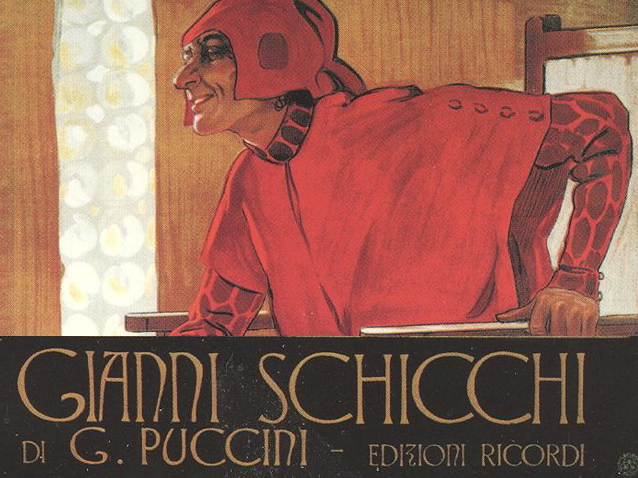Gianni Schicchi

by Giacomo Puccini
“Farewell, dear Florence, sublime, enchanted land. I wave goodbye to you, alas, without my hand”
This one-act opera is a small masterpiece of comedy from the greatest musical dramatist. Unlike the standard translation, mine follows the original rhyme scheme. This contributes immeasurably to its overall comic effect and entertainment value.
For all but those fluent in Italian, it is impossible to appreciate this opera’s subtle wit and deft characterizations unless performed in a faithful, artful English performing translation.
Excerpt:
Rinuccio: “Avete torto!“
“But you don’t know him! Quick-witted and wily, he is a man of the world. More importantly, he knows the law! Some people say he’s full of mischief, but he only makes fools of those who deserve it. If you like to eat crow, Gianni Schicchi will serve it! He’s preceded wherever he goes by his great red nose, which casts a dark shadow that belies the twinkle in his eyes and that sly smile. Born in the country? So what? Where’s the shame? Now it’s a man’s mind that counts, not just his name!“
Copyright Kenneth Jakobs 2003
All rights reserved
Notes
First performed in 1918 (at the Metropolitan Opera), just six years before the maestro’s death, Gianni Schicchi is Puccini’s only comedy, and what a brilliant satire it is. The greedy, snobbish relatives of a rich patriarch, recently deceased, are forced to rely on a ”new man”, i.e., one from a family with no reputation or wealth, to save them from ruin.
Set at the dawn of the Renaissance, the opera references some of its early masters and patrons, e.g., the Medici and Giotto. Gianni Schicchi is one of operas most lovable rogues, a man with a cunning mind and a taste for larceny. His resourcefulness contrasts with the lack of imagination displayed by the members of the aristocratic Donati family. They despise him for his low birth and coarseness, and are opposed to their son, Rinuccio, marrying his daughter, Lauretta.
When old Buoso Donati dies, leaving all his possessions to the Church, the disinherited family are desperate and have no idea how they might improve their situation. Though they consider him an inferior, they employ Schicchi to create a new will. This he accomplishes while at the same time managing to secure some of the prime assets for himself and the young lovers. Rinuccio and Lauretta are free to marry, and Schicchi asks the audience to be his jury and exonerate him with their applause.
